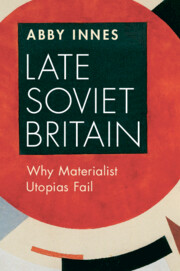Book contents
- Late Soviet Britain
- Late Soviet Britain
- Copyright page
- Epigraph
- Contents
- Figures
- Acknowledgements
- Introduction
- Part I The Materialist Utopias
- Part II Britain’s Neoliberal Revolution
- 5 The New Public Management, or Enterprise Planning in Capitalist Form
- 6 Quasi-markets in Welfare, or the Non-withering State
- 7 Tax Competition, or the Return of Regulatory Bargaining
- 8 Efficient Markets and Climate Change, or Soviet Cybernetics 2.0
- Part III The Rise and Fall of the Neoliberal ‘Movement Regime’
- Index
6 - Quasi-markets in Welfare, or the Non-withering State
from Part II - Britain’s Neoliberal Revolution
Published online by Cambridge University Press: 14 September 2023
- Late Soviet Britain
- Late Soviet Britain
- Copyright page
- Epigraph
- Contents
- Figures
- Acknowledgements
- Introduction
- Part I The Materialist Utopias
- Part II Britain’s Neoliberal Revolution
- 5 The New Public Management, or Enterprise Planning in Capitalist Form
- 6 Quasi-markets in Welfare, or the Non-withering State
- 7 Tax Competition, or the Return of Regulatory Bargaining
- 8 Efficient Markets and Climate Change, or Soviet Cybernetics 2.0
- Part III The Rise and Fall of the Neoliberal ‘Movement Regime’
- Index
Summary
This chapter examines UK welfare reforms. The strategy of ‘quasi-markets’ in welfare was a New Labour innovation, and this chapter sets out why even intentionally ‘progressive’ neoliberal state reforms succumb to the flaws in neoclassical reasoning. The ‘choice and competition’ agenda was conceived in arguments about the relative benefits for ‘end-users’ of publicly funded but privately provided welfare services. As a closed-system argument about a marketplace, it thus wished away the actual terrain of education policy in which the state becomes the disempowered, and yet still responsible planner of outsourced educational enterprises, now governed through contract. The chapter investigates how quasi-market theory played out in the Academy Schools programme in England. It demonstrates why outsourcing complex welfare provision will tend create the worst of public and private regimes: the exploitation of incomplete contracts by producers, informational fragmentation, a loss of public accountability, financial corruption and increasingly Kafkaesque efforts at bureaucratic remedy, all reminiscent of Soviet enterprise planning failures.
- Type
- Chapter
- Information
- Late Soviet BritainWhy Materialist Utopias Fail, pp. 173 - 220Publisher: Cambridge University PressPrint publication year: 2023

